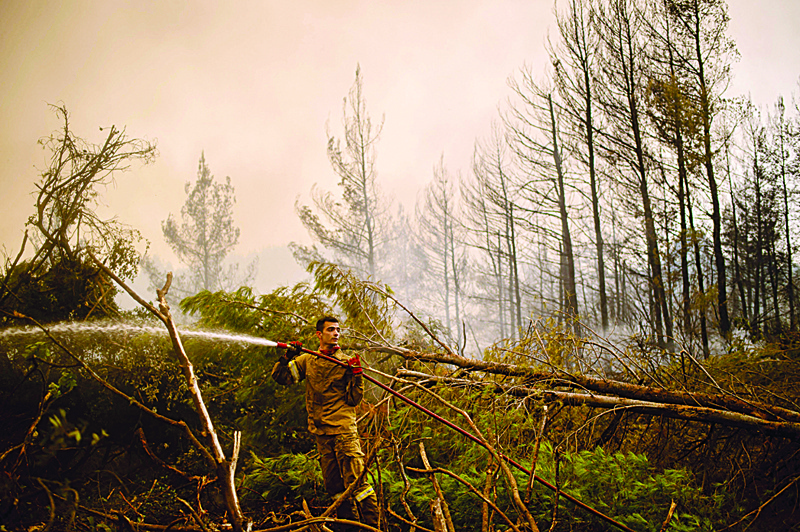 GLATSONA, Greece: A firefighter tries to extinguish a fire in this village on Evia island yesterday. - AFP
GLATSONA, Greece: A firefighter tries to extinguish a fire in this village on Evia island yesterday. - AFP
PEFKI, Greece: Firefighters battled heat and suffocating smoke for a seventh consecutive day Monday on the Greek island of Evia, swept by the most destructive of the wildfires that have destroyed hundreds of homes and forced thousands to flee. Greece and neighboring Turkey have been battling devastating blazes for nearly two weeks as the region suffers its worst heatwave in decades.
The wildfires continue as an alarming UN climate report warned that the planet is warming faster than previously estimated. Two people have been confirmed dead in Greece and eight in Turkey, while dozens have been hospitalized. While most of the fires that have blazed elsewhere in Greece for nearly two weeks have stabilized or receded, the ones on rugged and forested Evia - Greece's second largest island after Crete - were the most worrying, creating apocalyptic scenes.
Saving villages
Authorities were yesterday putting the priority on saving the villages of Kamatriades and Galatsades because "if the fire passes through there, it will end up in a thick forest that will be difficult to extinguish," firefighters told the Greek news agency ANA. As the sweeping wall of fire laid siege to one village after another on the north of the island, firefighters toiled until dawn to quench flames at Monokarya in order to protect the town of Istiaia, all without the help of water-dousing aircraft, ANA reported.
Thick and suffocating smoke yesterday also enveloped the coastal region of Pefki, where hundreds of villagers had been evacuated by sea, while others regrouped, an AFP reporting team said. Around 300 people evacuated from surrounding villages spent the night in a ferry moored near the long beach. Looming in the haze offshore, a military ship awaited further evacuees.
The ferry "was the only place where people could get a little peace and security," a military official, Panagiotis Charalambos, told AFP. Like many nearby communities, Pefki "had no electricity or water," he said. "Here, the people lived from the forest, from the crops, olives and tourism. There's nothing of that left now," said Louisa, a penioner in Pefki.
Finance Minister Christos Staikouras said up to 6,000 euros per household would be allocated to residents whose homes were damaged, as well as 4,500 euros for the injured. In the town of Aidipsos, collections of basic necessities were organized for villagers who had lost everything in the fire. "Have you seen the state offer us water? Snacks for the children? No one! They are just letting shopkeepers and individuals give water to people," Pefki resident Giorgos told AFP.
Climate change reality
While rain brought some respite from the blazes in Turkey over the weekend, Greece continued to suffer from an intense heatwave that Greek Prime Minister Kyriakos Mitsotakis said should show even doubters the hard reality of climate change. Yesterday's report by the UN's Intergovernmental Panel on Climate Change concluded that the 1.5C temperature goal of the Paris Agreement would likely be breached around 2030 - a decade earlier than it projected just three years ago.
Meanwhile the EU said it was mobilizing "one of Europe's biggest ever common firefighting operations" to assist Greece and other countries. The response was needed "as multiple fires affect several countries simultaneously," EU crisis management commissioner Janez Lenarcic said. Giorgos Kelaitzidis, Evia's deputy governor, echoed many when he blasted the "insufficient forces" to fight the fires while "the situation is critical" on the island. He said at least 35,000 hectares of land and hundreds of homes have been burned.
From July 29 to August 7, 56,655 hectares were burnt in Greece, according to the European Forest Fire Information System. The average area burnt over the same period between 2008 and 2020 was 1,700 hectares. Some 650 firefighters have so far been deployed on Evia, according to Greek authorities. But the air support faced "serious difficulties" because of turbulence, thick smoke and limited visibility, Greece's Civil Protection deputy minister Nikos Hardalias said.
The situation looked better elsewhere, with officials saying that fires in the southwestern Peloponnese region and in a suburb north of Athens had abated. A fire on Crete was brought under control. But Hardalias warned the risk of fires resurging was heightened. - AFP




